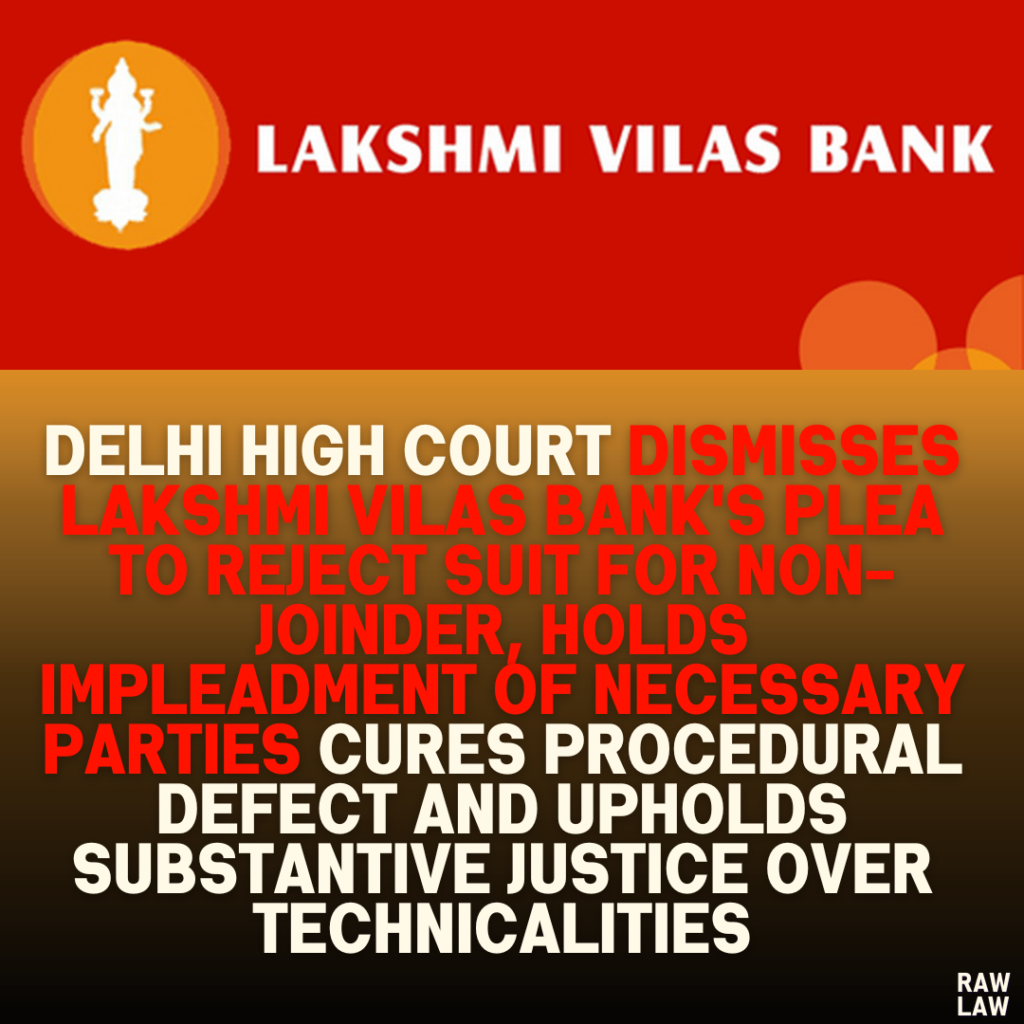Court’s Decision
The Delhi High Court dismissed the application filed by Lakshmi Vilas Bank (Defendant No. 1) under Order VII Rule 11 of the Code of Civil Procedure, 1908 (CPC), which sought to reject the plaint for non-joinder of necessary parties. The court reasoned that the earlier order dated 15.12.2023 allowed the impleadment of the required parties, resolving the issue of non-joinder. Consequently, the application under Order VII Rule 11 lacked merit and was dismissed.
Facts
- Nature of the Suit:
- The plaintiff, a financial services company, sought a declaration and recovery of Rs. 791.44 crores along with interest from Lakshmi Vilas Bank. The claim stemmed from disputes involving loans and securities created by entities related to the plaintiff.
- Defendant’s Application:
- Lakshmi Vilas Bank filed an application under Order VII Rule 11, asserting that the suit was defective because the plaintiff had failed to join RHC Holding Private Limited and Ranchem Private Limited, which were necessary parties to the dispute.
- Plaintiff’s Amendment:
- While the application was pending, the plaintiff filed a separate application under Order VI Rule 17 CPC to amend the plaint, seeking to implead RHC Holding Private Limited, Ranchem Private Limited, and two additional parties (Malvinder Mohan Singh and Shivinder Mohan Singh) as defendants.
- Court’s Order on Impleadment:
- On 15.12.2023, the court allowed the amendment application, permitting the impleadment of the aforementioned entities as defendants. This order was upheld by the Supreme Court, which clarified that the decision did not affect the merits of the application under Order VII Rule 11.
Issues
- Whether the suit should be dismissed for non-joinder of necessary parties.
- Whether the impleadment of additional defendants remedied the defect in the suit.
Petitioner’s Arguments
- Non-Compliance with Order VII Rule 11:
- The plaintiff argued that the grounds for rejection under Order VII Rule 11, such as lack of cause of action or suppression of material facts, were not satisfied.
- The plaintiff emphasized that the impleadment of necessary parties through the amendment had already resolved the issue.
- No Grounds for Rejection:
- It was contended that the application had become infructuous since the necessary parties were already impleaded.
Respondent’s Arguments
- RHC and Ranchem as Necessary Parties:
- The bank argued that RHC Holding and Ranchem Private Limited were indispensable parties as they were directly involved in the transactions concerning the loans and securities.
- It was claimed that these entities managed the loans and were thus crucial for adjudicating the dispute effectively.
- Legal Precedents Cited:
- The bank relied on several judicial precedents to support its contention:
- S.J.S Business Enterprises (P) Ltd. v. State of Bihar & Ors (2004) 7 SCC 166: Held that suppression of material facts disqualifies a litigant from obtaining relief.
- Mumbai International Airport (P) Ltd. v. Regency Convention Centre & Hotels (P) Ltd. (2010) 7 SCC 417: Established that the absence of a necessary party renders a suit defective and liable to dismissal.
- The bank relied on several judicial precedents to support its contention:
- Material Omission:
- The bank alleged that the plaintiff had deliberately omitted RHC Holding and Ranchem Private Limited from the plaint to suppress facts and mislead the court.
Analysis of the Law
- Order VII Rule 11 CPC:
- This provision allows the court to reject a plaint if essential procedural or substantive requirements are not met, such as lack of cause of action or failure to implead necessary parties.
- Necessary Parties:
- A necessary party is one whose presence is indispensable for resolving the dispute effectively. The court must ensure that the absence of such a party does not render any decree passed ineffective or unjust.
- Impleadment to Cure Defect:
- The court noted that procedural defects, such as the non-joinder of necessary parties, could be remedied through amendment and impleadment, provided these actions occurred before the conclusion of the trial.
Precedent Analysis
- Key Judgments Applied:
- Mumbai International Airport (P) Ltd.: Emphasized that necessary parties must be impleaded to ensure the decree is effective and enforceable.
- S.J.S Business Enterprises (P) Ltd.: Highlighted the importance of full disclosure and the impermissibility of suppressing material facts.
- Distinguishing Facts:
- The court distinguished the present case from precedents where suits were dismissed for non-joinder, as the defect here had been remedied through the amendment.
Court’s Reasoning
- The court observed that the plaintiff’s amendment application to implead RHC Holding Private Limited and Ranchem Private Limited as defendants had been allowed by an earlier order dated 15.12.2023. This development addressed the core contention of non-joinder of necessary parties.
- Since the necessary parties had been impleaded, the rejection application under Order VII Rule 11 was rendered baseless.
- The court emphasized that substantive justice should not be impeded by procedural technicalities, particularly when defects are curable.
Conclusion
- The application under Order VII Rule 11 CPC was dismissed as the impleadment of necessary parties had already rectified the procedural defect.
- The suit would proceed with the impleaded parties.
Implications
- Flexibility in Procedural Rules:
- This judgment highlights the courts’ willingness to prioritize substantive justice over procedural technicalities, especially when defects are corrected through timely action.
- Importance of Necessary Parties:
- The decision reiterates that the inclusion of all necessary parties is essential to ensure the effectiveness and enforceability of decrees.
- Strategic Use of Amendments:
- The case demonstrates how procedural amendments can be effectively employed to rectify defects and ensure that disputes are resolved on their merits.
